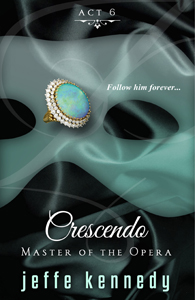
Tag: romance

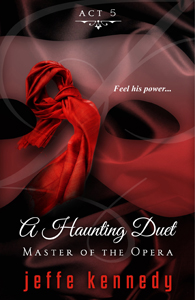
Master of the Opera, Act 5: A Haunting Duet
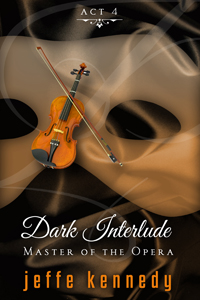
Master of the Opera, Act 4: Dark Interlude
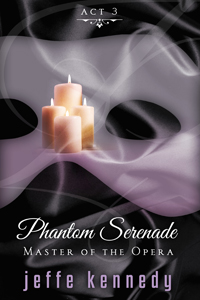
Master of the Opera, Act 3: Phantom Serenade
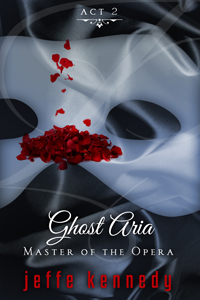
Master of the Opera, Act 2: Ghost Aria
Winners! And Do Movies Fail at Showing Romantic Love?
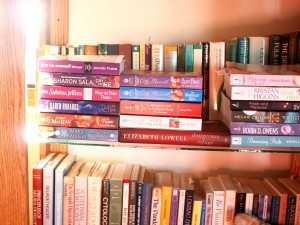 Okay, here are the books available for the giveaway! (The three stacks of horizontal ones.) You should be able to click on the pic to enlarge, if you can’t read it here. If you still can’t read the author names and book titles, ping me and I’ll tell you. The winners from yesterday’s author photo contest – and thanks so much to everyone who helped make such a tough decision! – selected via random number generator are:
Okay, here are the books available for the giveaway! (The three stacks of horizontal ones.) You should be able to click on the pic to enlarge, if you can’t read it here. If you still can’t read the author names and book titles, ping me and I’ll tell you. The winners from yesterday’s author photo contest – and thanks so much to everyone who helped make such a tough decision! – selected via random number generator are:
Angela E. Taylor
Misty Evans
Keena Kincaid
Yay! Each of you gets to pick a book and I’ll mail it to you! If any of these three pass, I’ll move on to the next random number. For the rest of you, there are 17 books there and I’ll be doing giveaways of them over the next several weeks until they’re all gone. First come, first served.
In fact, I’ll select one commenter on today’s blog to win the book of their choice!
So, we watched The Host last night. This is the movie made from Stephenie Meyer’s book of the same name, totally apart from her Twilight series. I haven’t read the book, though I heard many people liked it, some more than Twilight. It was a good story – about aliens that are sort of parasitic, that implant themselves into human bodies and take over their consciousness. In many cases the resident human spirit dies. In others, they’re shoved so far down that they can’t communicate. In one case, with a Louisiana bayou girl named Melanie, she can communicate with the alien, the Wanderer – or Wanda as they come to call her – and eventually influence her choices.
I don’t think the rest is spoilery, but stop reading if you don’t want to know what comes next.
Melanie/Wanda flees to the hiding place of Melanie’s small resistance group. Melanie’s lover is there. There’s interesting conflict because he believes Melanie’s spirit is dead and Wanda is just tricking them. Eventually he comes to see that Melanie really is still in there and Wanda herself falls in love with another guy.
The story pivots on this idea – that Wanda falls in love with Earth, with humans and with this particular man. The outcome of the story hinges on it.
But I’m not sure it’s convincing.
Knowing how well Meyer creates a completely believable love-affair between wildly different people/beings, without the useful assistance of sexual interaction, I suspect the book pulled this off. I’m tempted to read, just to see. If anyone here has read it, I’d be interested to know. The movie didn’t convince me, however.
I’m wondering if this isn’t why so many romantic movies don’t work. For all that writers are frequently chastised that a picture is worth a thousand words and that movies can convey so much more with one sweep of the lens, movies fall down on portraying the subtler emotions. Especially love.
Falling in love is such an internal change, complex and difficult to chart. The best romance novelists manage to do this without us realizing it. We fall in love right along with the characters, until it’s so obvious to us that they belong together that we can’t see it any other way.
I think A Room with a View managed to do this – where we knew they loved each other before the characters did. I’m not sure many other movies do.
Thoughts?
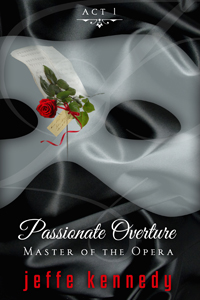
Master of the Opera, Act 1: Passionate Overture
Respecting the Tropes
 I’ve been reading a lot of books lately that I wouldn’t normally pick up.
I’ve been reading a lot of books lately that I wouldn’t normally pick up.
That’s because I’m judging for the Romance Writers of America (RWA) RITA awards. This is the romance genre’s version of the Hugo or the Oscar. Yeah, there might be some out there already snorting in disdain, but for our genre, this is one of the highest awards you can get. The first round is entirely peer-judged. As in, if you want to enter your book for the RITA, then you must judge. Thus, in mid-January, I received eight novels to read by the beginning of March.
We do get to pick categories, but otherwise I am reading books by authors I have never read before. All of them are a bit of a stretch from my normal pleasure reading. We’re asked to judge the book entirely on its quality and not whether or not we enjoy that particular kind of story, which is also a different lens.
It’s been interesting. And I’m over halfway through my pile, amazingly enough.
One of them is a new author discovery for me now. I gave her book a perfect score and look forward to reading more. Another, in a sub-genre I rarely read, I ranked very high. I don’t know that I’ll pick up her books again, for myself, but I could recognize how well she executed her craft.
One book, though written decently, failed as a romance, in my opinion. Oh, she had all the plot points in there. She faithfully followed the tropes, but they continued to feel empty to me. Contrived, even, which romance is so frequently accused of being.
So, here’s where I make a leap into a series of assumptions. I’m theorizing and obviously have no hard data to back up my ideas here.
It’s no secret that the romance genre is making big bucks these days. A fact that seems to seriously annoy all those who consider romance not worthwhile. Latest stats from RWA: $1.36 billion in sales each year, the largest share of the consumer-book market, more than a quarter of all books sold are romance. What writer doesn’t want some of that pie?
More and more, I’m seeing writers of other genres coming over to the romance field, to pump up their sales. Or adding touches of romance, in order to sell it on that shelf. And sure, sometimes this is the work of the publisher or marketing department, trying to slide in under that umbrella.
The thing is, it’s difficult to wield a trope you don’t love. See, a trope is like a cliché or an archetype. They can be powerful devices or cardboard dummies. A good romance embraces the full emotionalism of people coming together, with all the silliness, hearts, flowers, flying cupids, spats, passion, grand gestures and breathless, intimate moments that implies. It’s not easy to write clichés in a new, vivid and heartfelt way. But if a writer doesn’t tap into that deep store of energy that fuels the tropes in our hearts and minds, then all of that becomes cliché in the worst possible sense.
All of us romance readers love to giggle at the tropes. There are great blogs out there that encourage these discussions. We laugh at the impossibly virginal, feisty heroine and the alpha-male hero who also cooks and loves to brush her hair. And yet, when it’s done right, we also sigh in dreamy delight, and follow their story with fervent attention.
Why? Because the author takes the tropes and breathes life into them.
That doesn’t happen if the author, deep-down, doesn’t respect the tropes.
We might poke fun at the tropes like we roll our eyes at our husbands not being able to find anything without us, but if someone else makes out like our husbands are worthless? Oh no no no.
Use the power of the trope, young author.
But beware of taking it lightly.
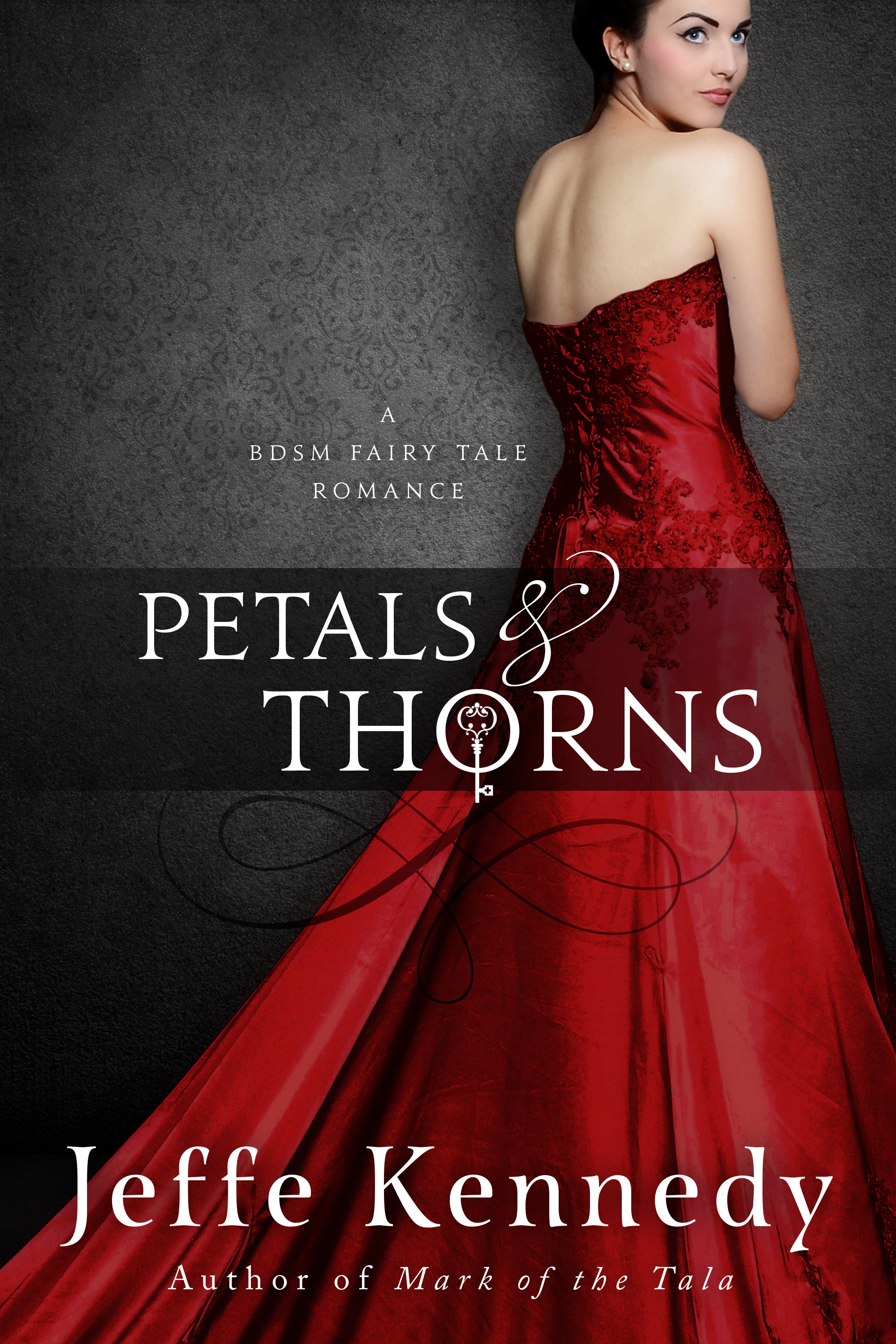
Petals & Thorns
Lucky

My mom is getting ready to sell her house.
This is the one she bought in 1972, just before my sixth birthday. She married my stepfather, Leo, a year later and they lived there until he died a few years ago.
When she remarried, my new stepfather sold his house in Denver and bought a house in Tucson. They’ve been dividing their time between my mom’s house in Denver for the summer and his house in Tucson for the winter.
Only the “winter” in Tucson has grown to be eight months or longer. And she just doesn’t enjoy her time in the Denver house anymore. It’s become a kind of museum of our family and not a living home. Also, the house is getting older and being left unmaintained for eight months at a time is too hard on it, especially during Colorado winters.
So, when my mom and Dave passed through here a few weeks ago on their annual migration north, and I could see how much she was dreading facing the house, I told her that, if my vote counted, that I’m fine with her selling the house.
I don’t think my vote should count, but she knows I have issues. Or did. I used to dream that she sold the house without telling me and I would come home to an empty shell. This is probably due to my dad dying when I was young and I had other issues about trying to hold onto stuff. But I’ve gotten much better about this kind of thing, as I mentioned the other day. Elizabeth Ryann commented that it’s like building a muscle – an image I just love.
So, the other day my mom updated me on the work they’re doing to fix up the house to sell and she mentioned that the park light on the front walk is gone now. It was broken and couldn’t be fixed. And it’s a bit funky for a house sale. I think she and Leo bought it in Taos or Santa Fe when they took out the old park lights and replaced them with new.
I was a bit taken aback – so much for my brave, deleting phase, and my mom replied “I know. I’m trying not to think about it.” So, I really did try not to write about it, I did, but I just had to.
Especially because I was telling David about it and how my mom thought we’d wired up the one broken arm at some point, which I don’t remember doing. He doesn’t either. But, it turns out, he has NO idea what light I’m talking about.
“The 12-foot tall iron lamp you have to pass to walk in the front door?” I say “With the four big arms with globes and another on top? The one that’s been there for 35 years and has formed the backdrop for 27,000 family photos??”
I might have been growing a bit shrill at this point, because he ducked his way out of the conversation. I might have sulked a little bit.
I’ve reached the midpoint of Sterling and I’m working at building the romance between the hero and heroine. Actually, I’ve been building it and now I want some delivery from them. One of the classic ways to show that their love is real and true is for the man to understand things about the woman that no one else does. He would, for example, know how she felt about the freaking park light on the front walk of her childhood home.
But real love doesn’t work that way and I know it.
Come January, David and I will have been together for twenty years. He does understand things about me. And when we go up to Denver, he’ll almost certainly remember that conversation and look at where the park light was and say something like “Oh, that light! I just didn’t know what you meant by ‘park light.'”
See? I know him, too.
I think the real love is in him letting me get a little shrill and sulky and letting it go. I suspect he knows this won’t be the last of the upheaval until the house is sold. There will be much deciding in the coming weeks of what to keep and what to let go of.
I know I can trust him to be by my side through all of it.
That’s the really difficult part to capture in a novel. I’m lucky to have it in real life.